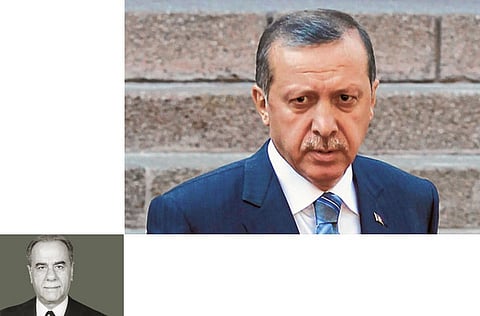Erdogan's call for secular constitutions
The Turkish model defines secularism as dealing with people of every religion in an equal manner

It is not new to say that Turkish Prime Minister Recep Tayyip Erdogan, is one of the emerging personalities in the Middle East's political arena.
Apart from his personal charisma, Turkey too had an important role in shaping the history of the area, especially given its current plans to play that role as well.
Turkey's role has been emphasised currently on a number of levels, such as the role of Islamic movements in the area, the need to find a substitute model to follow, the rise of the Iranian religious role and the sensitivity towards the political model it represents. Other issues include the impotency of the Arab stance on even Arab issues.
Tens of years have passed since the ascendance of the Justice and Development Party headed by Erdogan to power in Turkey amid complicated internal political circumstances. Erdogan was able to sail through these currents and play down the role of his political opponents.
Moreover, Erdogan was able to represent himself as a leader who understood the basic elements of international politics. He also understood the necessity of not bypassing the secular political system established by the father of modern Turkey: Mustafa Kemal Ataturk.
When the Justice and Development Party came to power in 2003, it was keen on presenting itself as a conservative party which accepts the secular line which modern Turkey was founded upon. Erdogan stated to one of Turkey's newspapers early on that the individuals inside the party embraced religion and not the party.
The West which considers Turkey as an important part of its political strategic system did not hide its concern about the repercussions that may result from the party's ascendance to power, and thus future relations with Turkey.
Disappointment
On the other hand, the West did not take a negative stand towards the party itself. It simply considered the party similar to the democratic Christian parties in Europe.
Erdogan was not content with the victories he achieved inside Turkey and strived to market the successful model of his party to the Islamic world, taking advantage of the circumstances of the Arab Spring. His calls of taking up secular constitutions have raised a number of questions in Egypt, Tunisia and Libya, as his call was received with mixed reactions inside Turkey, the Arab world and across the globe.
Some Islamic movements which received him with enthusiasm in these countries expressed their disappointment at his call for secular constitutions.
On the eve of his visit to Egypt, Erdogan said that the Turkish constitution defines secularism as dealing with people of every religion in an equal manner, and that a secular state is not opposed to religion. In truth, Erdogan talks about secularism in a manner which serves his political outlook. In his interview with the Dream satellite channel he said that he was not secular, rather, he is a Muslim who is the prime minister of a secular state. He also stressed that there are no contradictions between Islam and secularism in its modern sense.
I am not here to enter a debate about Erdogan's secular definitions, nor the meaning of "secular" as a term in English or French. Rather, I shall deal with the meaning of the term used in Erdogan's statements. In this regard we have to take into consideration that Erdogan is talking as a statesman who has to approach political issues in a way which safeguards the unity of the Turkish community and not as a person who believes in an Islamic ideology.
Erdogan's statements regarding the necessity of adopting a secular constitution can be understood and appreciated by intellectuals and statesmen that are more knowledgeable about the strengths and weaknesses of politics in a diverse-religion community. They understand that a secular constitution resembles a safety valve, maintains the country's unity, enhances its national security, and allows the country to merge into the international system.
Interference
So what are his chances of convincing majority of the people who cringe away when hearing the word ‘secular'?
Erdogan's statements were regarded as disappointing by a number of Islamic movements. They were also regarded as interfering in other countries' internal affairs. He disregarded these reactions and repeated his calls in Tunisia and Libya.
Why did he repeat his calls, while he could have easily maintained his high status in an environment which seems a bit unsuitable?
Among the strong reasons which made Erdogan repeat his calls is his deep belief that he carries a historical message that will place Islam in a better position internationally towards a better future for all humanity. He also regards being distinguished from the Iranian stand which seeks to polarise and attract Islamic movements after finding strong competitors in the Arab Spring movements.
He also made these calls to assure the strong secular movement in Turkey. The political elites in Egypt, Tunisia, and Libya will write their countries constitutions. Will Erdogan's calls which arise from a realistic and successful democratic model find a response?
Mohammad Akef Jamal holds a PhD in physics from the UK. He is a retired associate university professor and researcher in history and philosophy of science, environment, politics and water desalination.



